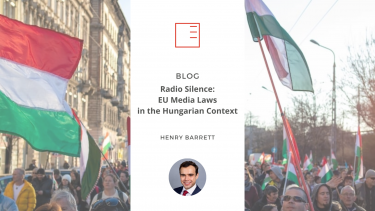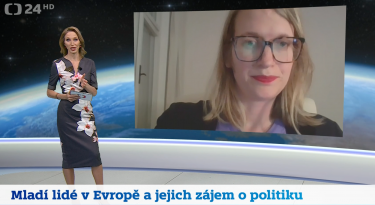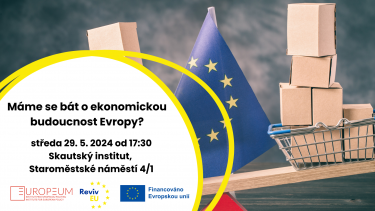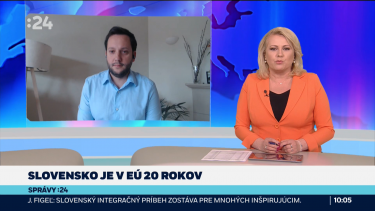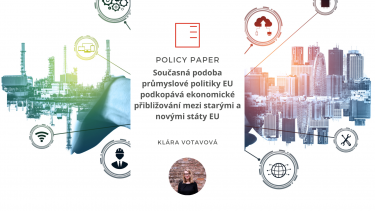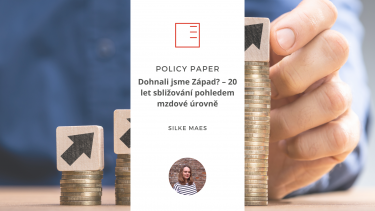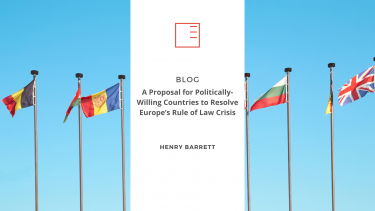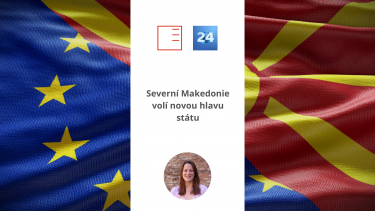BLOG | Radio Silence: EU Media Laws in the Hungarian Context
The European Union has passed major legislation to try and secure media freedom and independence in recent years. However, for the state of media pluralism in certain Member States, these efforts have come too late. In the Hungarian context, a pro-ruling party media ecosystem stands well-entrenched in the private and public media sector. Writes our researcher, Henry Barrett, a Fulbright-Schuman Grantee.
Zjistit víceČT24 | Is there growing interest among young people in European politics?
According to the Eurobarometer survey, 91% of young people aged 15-24 believe that participation in European elections is important. How does this attitude translate into practice? Does this mean that there will be an increase in voter turnout among young people? What advantages and opportunities does the European Union offer to younger citizens? Can Brussels effectively explain the benefits of EU membership to young people? These are the questions addressed by Klára Votavová, a research fellow at EUROPEUM Institute, for the Horizont programme on Czech TV.
Zjistit víceRevivEU | Should we fear for the economic future of Europe?
We invite you to a public podcast recording focusing on the discussion of the impacts of the COVID-19 pandemic on European industrial policy and its potential consequences for the Czech economy and society. We will discuss the new technological dynamics resulting from the pandemic and explore ways in which the European Union can respond to technological competition with the USA and China.
Zjistit víceRTVS | Slovakia has been in the EU for 20 years
Slovakia joined the European Union 20 years ago in its biggest enlargement to date. Among the main benefits of this move is an increase in the economy, up to 80%. Žiga Faktor, deputy director and head of EUROPEUM Institute's Brussels office, described the future direction of the Union.
Zjistit více
Policy paper | Current EU industrial policy undermines economic convergence between old and new EU countries
The post-communist states of Central and Eastern Europe, including the Czech Republic, joined the European Union at the height of globalisation and the dominance of the so-called Washington Consensus policies. However, the global economic crisis of 2008 showed shortly afterwards that these policies had their limits. Read more in Klára Votavová's Policy Pepeu.
Zjistit vícePolicy paper | Have we caught up with the West? - 20 years of convergence through the lens of wage levels
This year, the EU marks the anniversary of the biggest wave of enlargement in its history, when the Czech Republic joined the Union along with nine other Central and Eastern European countries. One of the main promises associated with enlargement was that the new Member States would catch up with Western Europe in terms of living standards. Read more in Silke Maes' policy paper.
Zjistit víceBLOG | A Proposal for Politically-Willing Countries to Resolve Europe’s Rule of Law Crisis
Given the lack of adequate EU responses over rule of law violations, politically-willing European states ought to consider a novel accountability mechanism. It is high time for committed European states to take innovative and decisive action on more than a decade of democratic backsliding sweeping the region and the world. Should European Union Member States concerned about rule of law violations seek a solution outside the EU institutions? Our researcher Henry Barrett, a Fulbright-Schuman Grantee, writes about this topic in his blog.
Zjistit víceČT24 | Northern Macedonia elects new head of state
Polls opened in North Macedonia on Wednesday for the first round of the presidential elections. Seven candidates are running for the presidency in a country gripped by political tensions, disappointment with democratic reforms and aspirations to join the European Union. Jana Juzová, a senior researcher at EUROPEUM Institute, analysed the situation in an interview for ČT24.
Zjistit víceiDnes.cz | What exactly is in the migration pact
The European Union has approved a migration pact, and from 2026 individual states will either accept their share of refugees or pay to opt out of this obligation. However, since the Czech Republic has already accepted a large number of refugees since the outbreak of the war in Ukraine, it should temporarily be exempt from this obligation. However, as noted by Viktor Daněk, deputy director of the Institute for European Policy EUROPEUM, this is not an exemption explicitly granted to Czechia. Exemptions are determined based on the number of people granted asylum or similar protection in a given country.
Zjistit víceTN.cz | Report on the EU internal market has a huge importance for Czechia
During the recent summit, politicians came to discuss key issues regarding the situation in Ukraine, the Middle East, relations with Turkey, and the competitiveness of the European Union against the United States and China. Executive Director of the EUROPEUM Institute, Martin Vokálek, provided commentary for TN.cz. According to him, it is crucial for Czech politicians and diplomats to be actively engaged in these discussions.
Zjistit více
Staroměstské náměstí 4/1
Praha 1 - Staré Město
110 00
tel.: +420 212 246 552
email: europeum@europeum.org
https://www.europeum.org
